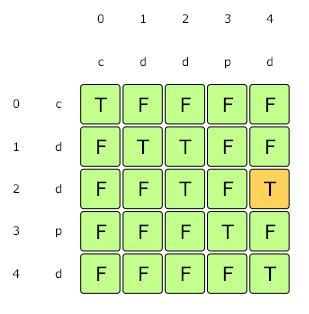Example 1
Input: "abdbca"
Output: 3
Explanation: Palindrome pieces are "a", "bdb", "c", "a".Example 2
Input: = "cddpd"
Output: 2
Explanation: Palindrome pieces are "c", "d", "dpd".Example 3
Input: = "pqr"
Output: 2
Explanation: Palindrome pieces are "p", "q", "r".Example 4
Input: = "pp"
Output: 0
Explanation: We do not need to cut, as "pp" is a palindrome.This problem follows the Longest Palindromic Subsequence pattern and shares a similar approach as that of the Longest Palindromic Substring.
The brute-force solution will be to try all the substring combinations of the given string. We can start processing from the beginning of the string and keep adding one character at a time. At any step, if we get a palindrome, we take it as one piece and recursively process the remaining length of the string to find the minimum cuts needed.
Here is the code:
def find_MPP_cuts(st):
return find_MPP_cuts_recursive(st, 0, len(st)-1)
def find_MPP_cuts_recursive(st, startIndex, endIndex):
# we don't need to cut the string if it is a palindrome
if startIndex >= endIndex or is_palindrome(st, startIndex, endIndex):
return 0
# at max, we need to cut the string into its 'length-1' pieces
minimumCuts = endIndex - startIndex
for i in range(startIndex, endIndex+1):
if is_palindrome(st, startIndex, i):
# we can cut here as we have a palindrome from 'startIndex' to 'i'
minimumCuts = min(
minimumCuts, 1 + find_MPP_cuts_recursive(st, i + 1, endIndex))
return minimumCuts
def is_palindrome(st, x, y):
while (x < y):
if st[x] != st[y]:
return False
x += 1
y -= 1
return True
def main():
print(find_MPP_cuts("abdbca"))
print(find_MPP_cuts("cdpdd"))
print(find_MPP_cuts("pqr"))
print(find_MPP_cuts("pp"))
print(find_MPP_cuts("madam"))
main()We can memoize both functions findMPPCutsRecursive() and isPalindrome(). The two changing values in both these functions are the two indexes; therefore, we can store the results of all the subproblems in a two-dimensional array. (alternatively, we can use a hash-table).
Here is the code:
def find_MPP_cuts(st):
n = len(st)
dp = [[-1 for _ in range(n)] for _ in range(n)]
dpIsPalindrome = [[-1 for _ in range(n)] for _ in range(n)]
return find_MPP_cuts_recursive(dp, dpIsPalindrome, st, 0, n - 1)
def find_MPP_cuts_recursive(dp, dpIsPalindrome, st, startIndex, endIndex):
if startIndex >= endIndex or is_palindrome(dpIsPalindrome, st, startIndex, endIndex):
return 0
if dp[startIndex][endIndex] == -1:
# at max, we need to cut the string into its 'length-1' pieces
minimumCuts = endIndex - startIndex
for i in range(startIndex, endIndex+1):
if is_palindrome(dpIsPalindrome, st, startIndex, i):
# we can cut here as we have a palindrome from 'startIndex' to 'i'
minimumCuts = min(
minimumCuts, 1 + find_MPP_cuts_recursive(dp, dpIsPalindrome, st, i + 1, endIndex))
dp[startIndex][endIndex] = minimumCuts
return dp[startIndex][endIndex]
def is_palindrome(dpIsPalindrome, st, x, y):
if dpIsPalindrome[x][y] == -1:
dpIsPalindrome[x][y] = 1
i, j = x, y
while i < j:
if st[i] != st[j]:
dpIsPalindrome[x][y] = 0
break
i += 1
j -= 1
# use memoization to find if the remaining string is a palindrome
if i < j and dpIsPalindrome[i][j] != -1:
dpIsPalindrome[x][y] = dpIsPalindrome[i][j]
break
return True if dpIsPalindrome[x][y] == 1 else False
def main():
print(find_MPP_cuts("abdbca"))
print(find_MPP_cuts("cdpdd"))
print(find_MPP_cuts("pqr"))
print(find_MPP_cuts("pp"))
print(find_MPP_cuts("madam"))
main()The above solution tells us that we need to build two tables, one for the isPalindrome() and one for finding the minimum cuts needed.
If you remember, we built a table in the Longest Palindromic Substring (LPS) chapter that can tell us what substrings (of the input string) are palindrome. We will use the same approach here to build the table required for isPalindrome(). For example, here is the final output from LPS for “cddpd”. From this table we can clearly see that the substring(2,4) => 'dpd' is a palindrome:

To build the second table for finding the minimum cuts, we can iterate through the first table built for isPalindrome(). At any step, if we get a palindrome, we can cut the string there. Which means minimum cuts will be one plus the cuts needed for the remaining string.
Here is the code for the bottom-up approach:
def find_MPP_cuts(st):
n = len(st)
# isPalindrome[i][j] will be 'true' if the string from index 'i' to index 'j' is a palindrome
isPalindrome = [[False for _ in range(n)] for _ in range(n)]
# every string with one character is a palindrome
for i in range(n):
isPalindrome[i][i] = True
# populate isPalindrome table
for startIndex in range(n-1, -1, -1):
for endIndex in range(startIndex+1, n):
if st[startIndex] == st[endIndex]:
# if it's a two character string or if the remaining string is a palindrome too
if endIndex - startIndex == 1 or isPalindrome[startIndex + 1][endIndex - 1]:
isPalindrome[startIndex][endIndex] = True
# now lets populate the second table, every index in 'cuts' stores the minimum cuts needed
# for the substring from that index till the end
cuts = [0 for _ in range(n)]
for startIndex in range(n-1, -1, -1):
minCuts = n # maximum cuts
for endIndex in range(n-1, startIndex-1, -1):
if isPalindrome[startIndex][endIndex]:
# we can cut here as we got a palindrome
# also we don't need any cut if the whole substring is a palindrome
minCuts = 0 if endIndex == n - \
1 else min(minCuts, 1 + cuts[endIndex + 1])
cuts[startIndex] = minCuts
return cuts[0]
def main():
print(find_MPP_cuts("abdbca"))
print(find_MPP_cuts("cdpdd"))
print(find_MPP_cuts("pqr"))
print(find_MPP_cuts("pp"))
print(find_MPP_cuts("madam"))
main()✓→ Longest Common Substring